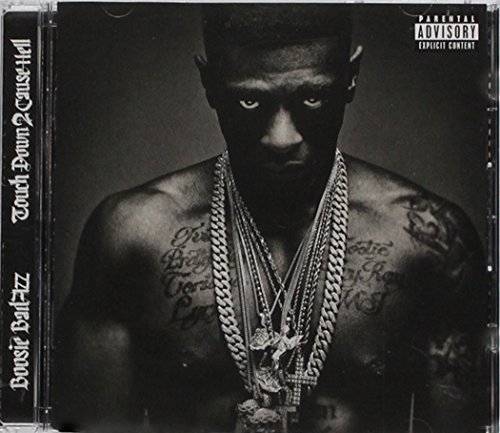
Boosie Badazz
Touch Down 2 Cause Hell
Release Date: May 26, 2015
Genre(s): Rap
Record label: Atlantic
Music Critic Score
How the Music Critic Score works
Buy Touch Down 2 Cause Hell from Amazon
Album Review: Touch Down 2 Cause Hell by Boosie Badazz
Great, Based on 8 Critics
Based on rating 8/10
At 19 tracks long, Boosie Badazz's 2015 LP is a bit overstuffed, but this post-prison release is a serious step up for the rapper, offering a more weighty and informed outlook while retaining both the party-time attitude and gangster stance of his previous work. Best example could be the infectious "On That Level," where the snarling rapper offers a more metaphorical version of his usual strip-club talk ("I got that look in my system/Someone's gonna be my victim"), while "Hip Hop Hooray" with homeboy Webbie comes with a chilling threat to all those who claim the hood but have no proof ("You don't know the first steps on how to whip a brick/You too tender dick that I'm a trying to pimp a bitch"). Raising the bar to a level that seemed unobtainable before, "Black Heaven" looks to the sky and is both proud ("Biggie Smalls prolly swagged out, laid-back/Him and Eazy talkin' bout how it was way back") and poignant ("I know Dr.
Based on rating 4.0/5
The timing of Boosie’s release from prison couldn’t have been more perfectly timed with where pop-as-rap is currently situated. Atlanta (and by extension the South) runs the game, and entire generations of young rappers are excelling at doing what was, until this album release, their best “Lil Boosie impersonations.” On Touch Down 2 Cause Hell, the Louisiana rapper does just that, returning to “touch down” on his throne as one of the South’s founding rap fathers and kings of the style. In painting vivid portraits of urban realities over largely magnificent productions, the emcee has crafted an excellent release that also shows the street legend potentially taking his skills to another level of greatness.
Based on rating 7.4/10
Torrence "Boosie Badazz" Hatch is a Southern rap legend. Everyone seeking to understand the current rap landscape should know this. After his cousin Young Bleed (yup, the "How Ya Do Dat" Young Bleed of No Limit Records fame) helped him sign with the late Pimp C's Trill Entertainment in 2001, Boosie released a series of mixtapes and albums that set his career on fire.
Based on rating 3.5/5
Fans and critics often compare Boosie to the late Tupac Shakur. "2Pac of the South" is what they called Lil' Boosie, who now goes by Boosie Badazz. Whether such a comparison is vaguely sacrilegious will depend, for the most part, on your generation; in any case, let's briefly concede the key merits. Boosie and 2Pac are both partygoing moralizers who bark loudest when presenting their various resentments.
Opinion: Excellent
Until this weekend, Boosie Badazz had been the Lionel Messi of the rap game for me. I was certainly aware of his existence, I knew that for many people he was a superstar, maybe even a god, and I wasn't about to argue with them. For all I knew they were right, that was the point - I just didn't know. Messi's not really in my world beyond the occasional ESPN highlight sideways-glimpsed at a bar or the quadrennial excitement of the World Cup.
Opinion: Excellent
The list of rappers recovering from extended prison sentences and returning to rap relevance is a short one; only Tupac, Lil Wayne, T.I. and more than likely Gucci Mane can boast that they didn’t truly lose a step while locked up. But none of them spent anywhere near the four-plus years behind bars that Boosie BadAzz endured, with nearly all of it spent wondering if there would be any daylight at the end of the road.
Opinion: Great
In just three years, Boosie Badazz has gone from facing the death penalty at Louisiana's notorious Angola State Penitentiary (he was found not guilty on murder charges) to releasing a major-label LP with Young Thug, T.I. and Rick Ross. In the interim, his music became an ad hoc soundtrack to the protests on the bloody streets of Ferguson, Mo., and he's ascended to the current vanguard of weird Southern rap with tales of post-prison life that add essential new layers to today's music of police protest.
Opinion: Very Good
We devour music at such a feverish pace that, more and more, great collections of songs fall through the cracks. In the case of the past six weeks, we uncovered such missed gems as Sacred Bones’ idea of body music and Phil Elverum’s take on Mark Kozelek’s confessional style. Meanwhile, a ….
'Touch Down 2 Cause Hell'
is available now

